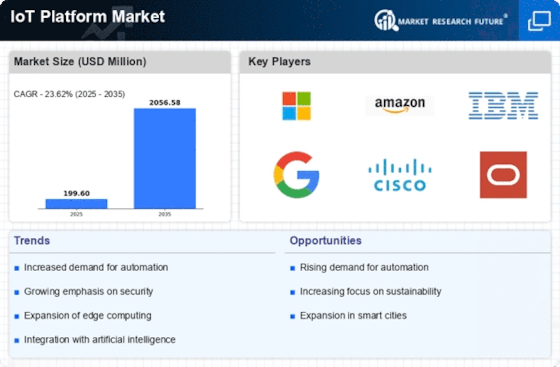Market Analysis
In-depth Analysis of IOT Platform Market Industry Landscape
The IoT (Internet of Things) platform market is subject to a multitude of factors that significantly influence its growth and development. A fundamental driver of this market is the increasing proliferation of connected devices across various industries. As more devices become capable of gathering and transmitting data, the demand for robust IoT platforms that can efficiently manage and analyze this data rises. These platforms act as the backbone for IoT applications, offering functionalities such as data storage, device management, and real-time analytics.
Technological advancements play a pivotal role in shaping the dynamics of the IoT platform market. The continuous evolution of technologies like edge computing, artificial intelligence, and 5G connectivity enhances the capabilities of IoT platforms. Edge computing, in particular, allows data processing to occur closer to the source, reducing latency and improving overall system efficiency. The integration of these technologies not only makes IoT platforms more powerful but also opens up new possibilities for innovative applications across various sectors.
The security landscape is a critical factor influencing the IoT platform market. With the increasing number of connected devices, concerns about data privacy and security become paramount. IoT platforms need to incorporate robust security measures to protect sensitive information and prevent unauthorized access. As cybersecurity threats evolve, businesses and organizations prioritize platforms that offer advanced security features, contributing to the overall growth and adoption of IoT platforms.
Regulatory considerations also shape the trajectory of the IoT platform market. Governments worldwide are introducing regulations and standards to address concerns related to data privacy and security in IoT deployments. Compliance with these regulations becomes a crucial factor for businesses when selecting IoT platforms. Platforms that adhere to industry standards and regulatory requirements gain a competitive edge in the market, as businesses seek solutions that align with legal frameworks.
The competitive landscape is another significant factor impacting the IoT platform market. The market is characterized by a diverse range of vendors offering different features and functionalities. Competition fosters innovation as vendors strive to differentiate themselves and provide unique value propositions. This diversity benefits businesses by offering a variety of options, allowing them to choose platforms that best fit their specific needs and requirements.
Economic conditions and global trends also influence the IoT platform market. In times of economic uncertainty, businesses may prioritize cost-effective solutions and scalable platforms that offer flexibility. Emerging trends, such as the rise of smart cities and Industry 4.0, create new opportunities for IoT platforms. Businesses across sectors are increasingly investing in these platforms to harness the potential of IoT in optimizing operations and enhancing efficiency.
Customer demands and expectations play a crucial role in driving the adoption of IoT platforms. As consumers and businesses alike seek more connected and intelligent solutions, IoT platforms become instrumental in delivering seamless and integrated experiences. From smart homes to industrial automation, the demand for IoT platforms that can facilitate interoperability and connectivity continues to grow.


















Leave a Comment